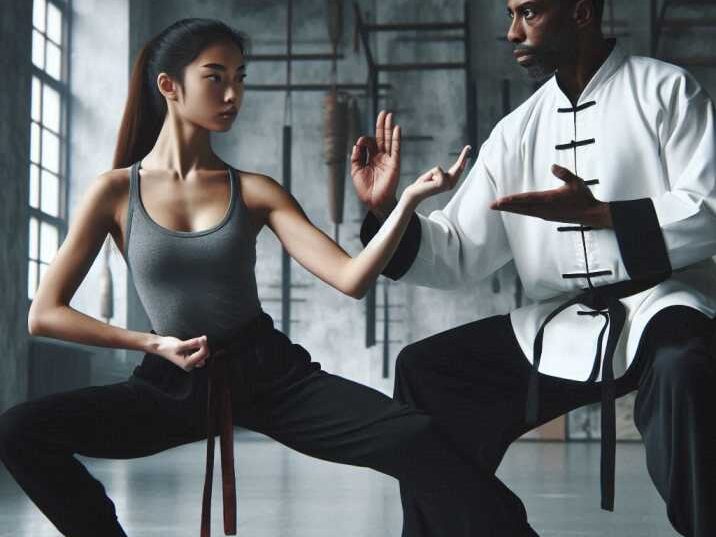Introduction
Table of Contents
Kung Fu is a fascinating martial art with a rich history and deep cultural significance. But what exactly does “Kung Fu” mean, and how can it benefit you beyond just learning self-defense? In this article, we’ll explore the meaning of Kung Fu, its historical roots, and how training in this martial art can lead to improved focus and discipline in various aspects of life, including school.

What Is Kung Fu?
Kung Fu (功夫) is a Chinese term that can be translated as “skill achieved through hard work.” The term is often used to describe a range of traditional Chinese martial arts. Unlike some martial arts that focus solely on fighting techniques, Kung Fu encompasses a broad array of practices that include physical, mental, and spiritual training.
Historical Background
Kung Fu has a long history dating back thousands of years. It originated in China and was influenced by various philosophies, including Confucianism, Taoism, and Buddhism. The martial art developed through the combination of traditional Chinese military techniques and the teachings of various monks and martial artists.
Components of Kung Fu
Kung Fu is a comprehensive martial art that goes beyond mere combat techniques. It encompasses a variety of components that together contribute to a practitioner’s overall skill and development. Here’s a closer look at each of these components:
1. Forms (Katas)
Forms—also known as katas in some martial arts—are structured sequences of movements performed in a specific order. These movements simulate various combat scenarios and are designed to improve a practitioner’s technique and discipline.
- Purpose: Forms help practitioners learn and internalize fundamental techniques and movements. They offer a way to practice techniques in a controlled environment, allowing for the refinement of skills without the need for a partner.
- Benefits: Regular practice of forms enhances muscle memory, coordination, and balance. It also helps in understanding the application of techniques in different situations and improves overall fluidity and precision in movements.
2. Techniques
Techniques refer to the specific strikes, kicks, blocks, and stances used in martial combat. These techniques are the building blocks of Kung Fu and are essential for effective self-defense and fighting.
- Strikes: Techniques such as punches and palm strikes are used to hit an opponent with force and accuracy.
- Kicks: Various types of kicks, like front kicks and roundhouse kicks, are employed to attack an opponent from different angles.
- Blocks: Blocking techniques are used to defend against incoming attacks by intercepting or redirecting them.
- Stances: Proper stances provide stability and support during both offensive and defensive maneuvers. They also enhance the effectiveness of techniques and help maintain balance.

3. Philosophy
Philosophy in Kung Fu encompasses the teachings and principles that guide practitioners beyond the physical aspects of training. This includes concepts drawn from Chinese philosophy, such as Taoism, Confucianism, and Buddhism.
- Balance: One of the core principles in Kung Fu is achieving balance—not just physically, but also mentally and emotionally. Balance helps practitioners maintain control and harmony in their movements and interactions.
- Respect: Respect for oneself, instructors, and fellow practitioners is fundamental in Kung Fu. It fosters a positive training environment and encourages personal growth and mutual support.
- Self-Improvement: Kung Fu emphasizes the importance of continual self-improvement. Practitioners are encouraged to strive for personal development, both in their martial skills and their character.
4. Conditioning
Conditioning involves physical exercises and training methods designed to enhance a practitioner’s overall fitness and physical capabilities. This component is crucial for building the strength, flexibility, and endurance required for effective Kung Fu practice.
- Strength Training: Exercises to build muscle strength improve a practitioner’s ability to execute techniques with power and effectiveness.
- Flexibility Training: Stretching and flexibility exercises are essential for performing high kicks, deep stances, and other dynamic movements.
- Endurance Training: Cardiovascular exercises and endurance drills help practitioners maintain energy and stamina throughout long training sessions and during extended combat scenarios.
The Meaning of Kung Fu
The term “Kung Fu” (功夫) is often interpreted in various ways, but its literal translation is “work done with great effort.” This phrase encapsulates the essence of what Kung Fu represents: a journey of dedication, skill development, and personal growth. Here’s a closer look at what Kung Fu truly means and its broader implications:
1. Skill and Mastery
Kung Fu is not just a set of fighting techniques; it embodies the pursuit of mastery through consistent effort and practice. Here’s why skill and mastery are central to its meaning:
- Continuous Practice: Mastery in Kung Fu training takes years of dedicated practice. Unlike skills that might be quickly acquired, Kung Fu requires practitioners to spend significant time perfecting their techniques and forms. This long-term commitment reflects the true essence of “Kung Fu” as work done with great effort.
- Perseverance: Achieving proficiency in Kung Fu demands perseverance and resilience. Practitioners face numerous challenges and setbacks along the way, and overcoming these obstacles is part of the journey to mastery. The term “Kung Fu” highlights the importance of perseverance in achieving excellence in any field, not just martial arts.
- Holistic Skill Development: Mastery in Kung Fu involves more than just physical prowess. It includes the development of mental focus, strategic thinking, and the ability to adapt techniques to various situations. This comprehensive skill development underscores the value of hard work and dedication.
2. Cultural Significance
Kung Fu is deeply embedded in Chinese culture and history. Its cultural significance extends beyond its martial aspects:
- Reflection of Chinese Values: Kung Fu reflects important values and traditions of ancient China. These include principles such as respect for authority, the pursuit of balance, and the harmony of body and mind. Practicing Kung Fu often involves learning about these cultural values and integrating them into one’s life.
- Historical Context: The practice of Kung Fu is intertwined with Chinese history and mythology. Many Kung Fu styles and techniques have historical origins linked to ancient Chinese warriors, philosophers, and monks. Understanding this historical context adds depth to the practice and helps practitioners appreciate its cultural heritage.
- Philosophical Foundations: Kung Fu incorporates elements from Chinese philosophy, including Confucianism, Taoism, and Buddhism. These philosophies emphasize the cultivation of inner virtues, ethical behavior, and the balance between opposites. Practicing Kung Fu often involves exploring these philosophical teachings, which enrich the training experience.
3. Personal Growth
Kung Fu training fosters significant personal growth, influencing various aspects of a practitioner’s life:
Self-Discipline: The rigorous training of Kung Fu required instills self-discipline. Practitioners learn to set goals, maintain focus, and manage their time effectively, skills that are beneficial in academic, professional, and personal settings.
Patience: Kung Fu training requires patience as practitioners work through complex techniques and forms. Learning to wait for progress and understanding that skill development is gradual helps build patience in other areas of life.
Humility: Kung Fu teaches humility by emphasizing that no matter how skilled one becomes, there is always more to learn. This mindset encourages practitioners to remain humble and open to growth, both in martial arts and in their personal lives.
Respect: Respect is a core value in Kung Fu, extending to instructors, peers, and oneself. By learning to respect others and adhere to etiquette, practitioners develop a respectful attitude that positively influences their interactions and relationships outside the dojo.
How Kung Fu Training Enhances Focus and Discipline
Kung Fu Training requires a high level of concentration and discipline. Here’s how practicing Kung Fu can improve focus in school and other activities:
1. Improved Concentration
Kung Fu training involves complex movements and techniques that require intense focus. This constant need for concentration can help improve attention span and cognitive function. Students who practice Kung Fu may find it easier to concentrate on their studies and other tasks.
2. Enhanced Discipline
Kung Fu instills discipline through its structured training regimen. Practitioners must adhere to strict routines and respect their instructors and fellow students. This sense of discipline can translate to better time management and organization in academic settings.
3. Stress Relief
The physical activity involved in Kung Fu helps release stress and tension. By learning how to manage stress through physical exercise and meditation, students can maintain a more balanced and calm approach to their studies and daily responsibilities.
4. Goal Setting
Kung Fu training often involves setting and achieving goals, such as mastering a new technique or earning a new belt rank. This goal-setting practice can help students develop a goal-oriented mindset, which is valuable for academic success.
5. Enhanced Physical Health
Regular Kung Fu practice improves overall physical health, including strength, flexibility, and endurance. Healthy students are more likely to perform well in school and have the energy to focus on their studies.
Table of Information Meaning of Kung Fu
| Aspect | Details |
|---|---|
| Term | Kung Fu (功夫) |
| Translation | Skill achieved through hard work |
| Historical Roots | Ancient China, influenced by Confucianism, Taoism, Buddhism |
| Key Components | Forms, Techniques, Philosophy, Conditioning |
| Benefits | Improved Concentration, Enhanced Discipline, Stress Relief, Goal Setting, Enhanced Physical Health |
Conclusion
Kung Fu training is much more than just a martial art; it is a comprehensive practice that involves skill development, cultural education, and personal growth. Through its rigorous training, Kung Fu teaches valuable life skills such as concentration, discipline, and stress management. By embracing Kung Fu, students and practitioners can enhance their focus in school and other areas of life, ultimately leading to a more balanced and disciplined approach to their daily activities.
FAQs
1. What does “Kung Fu” literally mean?
“Kung Fu” means “skill achieved through hard work.”
2. Is Kung Fu only about fighting?
No, Kung Fu includes physical, mental, and philosophical training.
3. How can Kung Fu improve my focus in school?
Kung Fu training enhances concentration and discipline, which can help with academic focus.
4. What are some key components of Kung Fu training?
Key components of Kung Fu training include forms, techniques, philosophy, and conditioning.
5. Can Kung Fu help with stress relief?
Yes, the physical activity and meditation in Kung Fu can help reduce stress.


